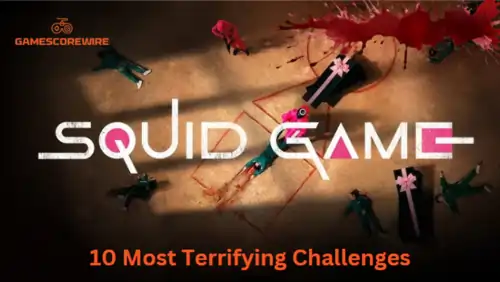
Table of Contents
The Netflix phenomenon Squid Game returned on December 26, 2024, with its highly anticipated Season 2. With more deadly games, shocking betrayals, and gut-wrenching twists, the second season elevated the stakes as Gi-hun (Lee Jung-jae) embarked on a mission to dismantle the Squid Game competition from within. However, he finds himself thrust back into the perilous games, where his past experiences are both a blessing and a curse. Let’s take a deeper look at the top 10 most terrifying games from Squid Game Seasons 1 and 2, ranked sequentially and expanded for clarity and engagement.
1. Red Light, Green Light (Season 1, Episode 1)
As the first game in the competition, “Red Light, Green Light” introduces players to the deadly stakes of Squid Game. The rules are deceptively simple: players must cross the finish line while stopping whenever the robotic doll turns to face them. The doll’s sharp sensors detect even the smallest movements, and those caught moving are instantly eliminated.
The game’s simplicity is what makes it so terrifying. As players struggle to suppress natural reflexes like trembling or shifting their weight, panic ensues. Chaos unfolds when frightened players inadvertently trigger a chain reaction, leading to mass casualties. For many, “Red Light, Green Light” is their first glimpse of the brutal reality of Squid Game—a moment that cements its chilling impact. Read more:
2. Dalgona (Season 1, Episode 3)
In the second game, players must carefully extract a designated shape—circle, triangle, star, or umbrella—from a delicate honeycomb cookie using nothing but a needle. The fragility of the cookie adds a layer of suspense as even the slightest crack results in immediate elimination.
What makes “Dalgona” particularly harrowing is the psychological pressure. Watching others’ cookies shatter amplifies the tension. Players with complex shapes like the umbrella face near-impossible odds, forcing them to resort to desperate measures like licking the cookie to weaken it. This simple childhood game becomes a high-stakes test of patience and ingenuity.
3. Tug of War (Season 1, Episode 4)
Unlike the individual-focused games, “Tug of War” demands teamwork. Two groups pull against each other on a high platform, with the losing team plummeting to their deaths. Strength is crucial, but as Gi-hun’s team demonstrates, strategy and timing can make all the difference.
The terror in “Tug of War” lies in its brutal physicality and the sheer helplessness of falling. The game’s life-or-death stakes force players to trust their teammates completely, even when survival feels unlikely. For weaker or outnumbered teams, the fear is palpable.
4. Marbles (Season 1, Episode 6)
The fourth game takes an emotional toll as players must pair up and compete against their partner. The objective: win all ten marbles through any game of their choosing. The catch? Only one can survive.
What makes “Marbles” uniquely heartbreaking is its betrayal of trust. Many players enter the game with loved ones or allies, only to realize they must defeat them to live. The intimate nature of the game—set in a quiet, haunting environment—contrasts sharply with the violence of other challenges, amplifying its emotional devastation.
5. Glass Bridge (Season 1, Episode 7)
Arguably one of the most nerve-wracking games, “Glass Bridge” forces players to navigate a path made of tempered and fragile glass panels. Only one of the two panels in each row can support their weight, leaving a 50/50 chance with every step.
The suspense builds as players ahead test the panels, often falling to their deaths and leaving those behind with fewer options. The shattering glass and desperate leaps create an atmosphere of sheer terror. To make matters worse, the glass explodes after the game, injuring or killing those who linger too long.
6. Squid Game (Season 1, Episode 9)
The final game shares its name with the series and represents the culmination of all the players’ hardships. Played on a squid-shaped diagram, this violent game pits offense against defense. The offensive player must reach the squid’s head while the defender tries to stop them—by any means necessary.
Unlike previous games, “Squid Game” encourages physical aggression, with only one player emerging victorious. The high stakes and raw brutality of this final challenge make it the most intense and personal showdown of the competition.
7. Gonggi (Season 2, Episode 4)
In “Gonggi,” players use five small stones to perform a series of intricate maneuvers, such as tossing and catching the stones mid-air. Precision and timing are key, as the game becomes progressively harder with each round.
What elevates the fear factor in “Gonggi” is the strict time limit. Players’ nerves often get the better of them, causing mistakes that force them to restart. The combination of dexterity and time pressure creates a relentless sense of dread.
8. Flying Stone (Season 2, Episode 4)
Known as “Biseokchigi” in Korea, “Flying Stone” requires players to knock over a distant stone using a thrown rock. On paper, it seems simple, but the reality is far more demanding, especially since this game is part of the grueling six-legged pentathlon.
The horror lies in the logistics: if a player misses, their entire team—chained together—must retrieve the stone, wasting precious time. The physical and mental strain, combined with the ticking clock, turns this childhood pastime into a nightmare.
9. Spinning Top (Season 2, Episode 4)
As the fourth stage of the six-legged pentathlon, “Spinning Top” involves spinning a toy top using a string. Success requires finesse and accuracy, and failure means starting over, eating into the already limited time.
Coming after the physically exhausting earlier games, “Spinning Top” becomes a test of endurance and composure. The heightened urgency makes even a simple misstep feel catastrophic, amplifying the players’ fear and desperation.
10. Mingle (Season 2, Episode 6)
“Mingle” breaks from the individualistic nature of most games by forcing players into fluctuating teams. When a number is called, players must quickly gather into groups of that size and enter designated rooms. Those unable to find a group are eliminated.
The psychological torment in “Mingle” stems from its social dynamics. Introverted or isolated players face immense challenges, while alliances are tested and betrayals abound. The game highlights the importance of adaptability and social strategy in a way that is both terrifying and unpredictable.
Final Thoughts
“Squid Game” excels at turning childhood games into nightmare-inducing scenarios. Whether it’s the physical danger, emotional toll, or strategic manipulation required, each game presents a unique and terrifying challenge. With the introduction of Season 2’s new games, the stakes have risen, leaving audiences eagerly awaiting what horrors the series will conjure next.
Disclaimer: This article is for informational and entertainment purposes only. It is based on the fictional events and games depicted in the Netflix series Squid Game and does not promote or endorse any violent or harmful activities. All opinions expressed are those of the author and do not represent the official stance of Netflix or its affiliates. Viewer discretion is advised due to the series’ mature themes.
Gamescorewire neither endorses nor supports any opinions or actions depicted in this content.








